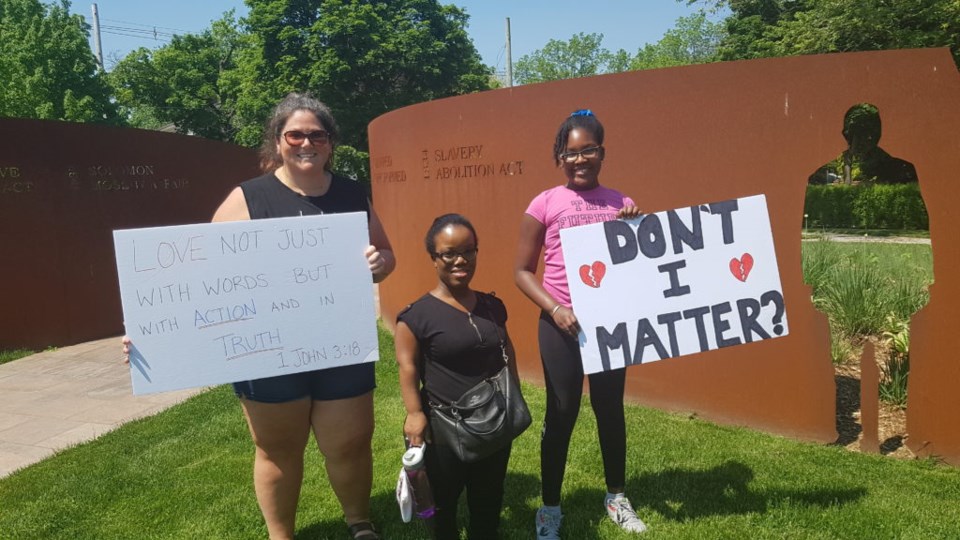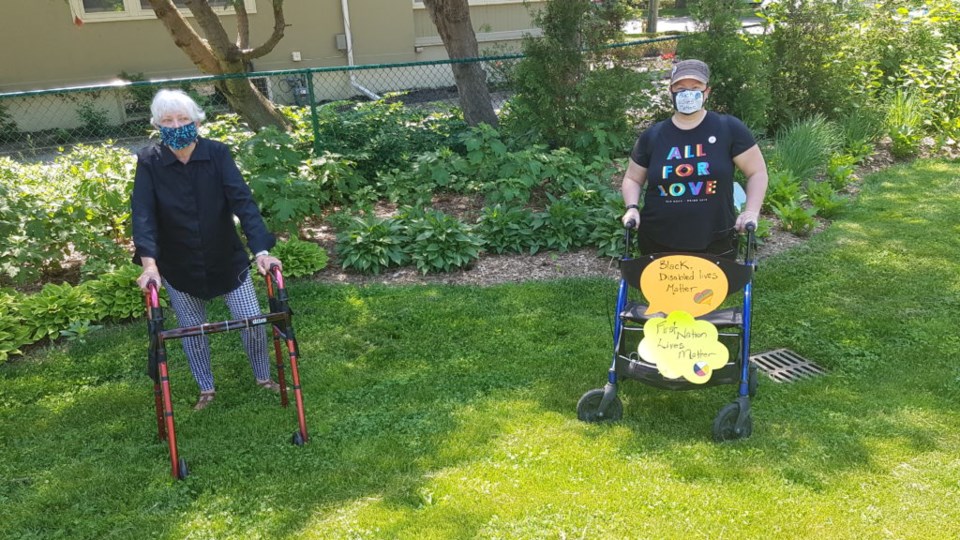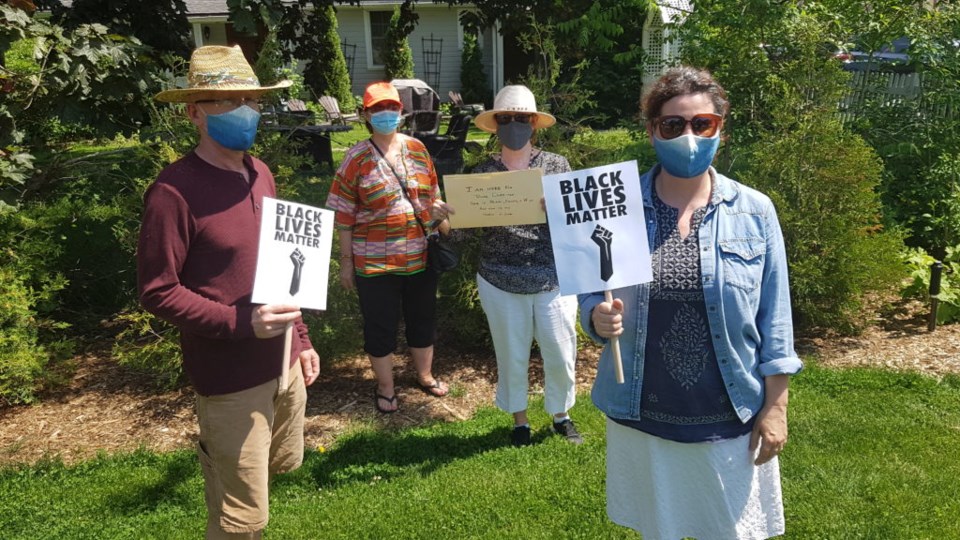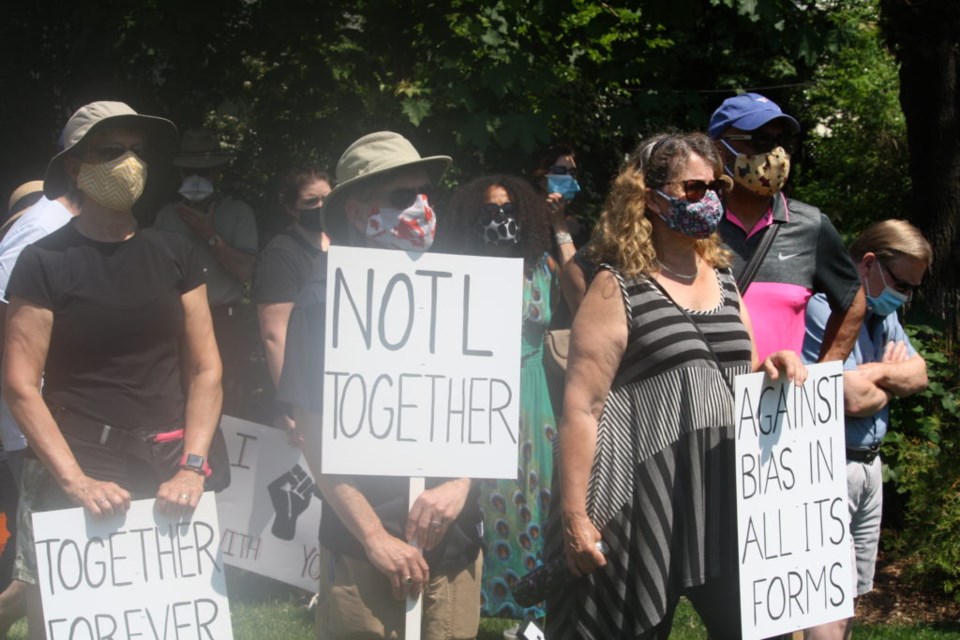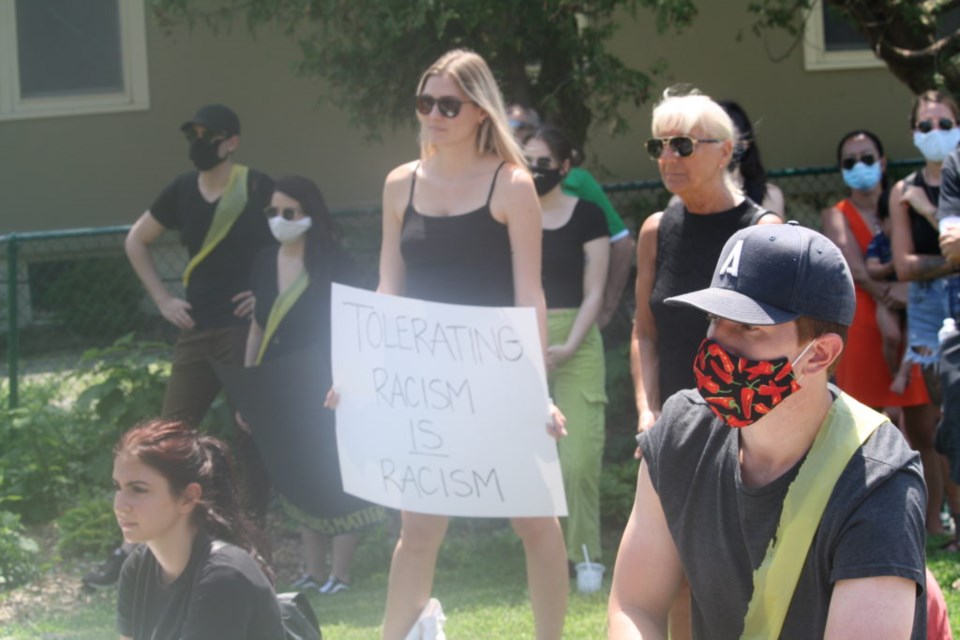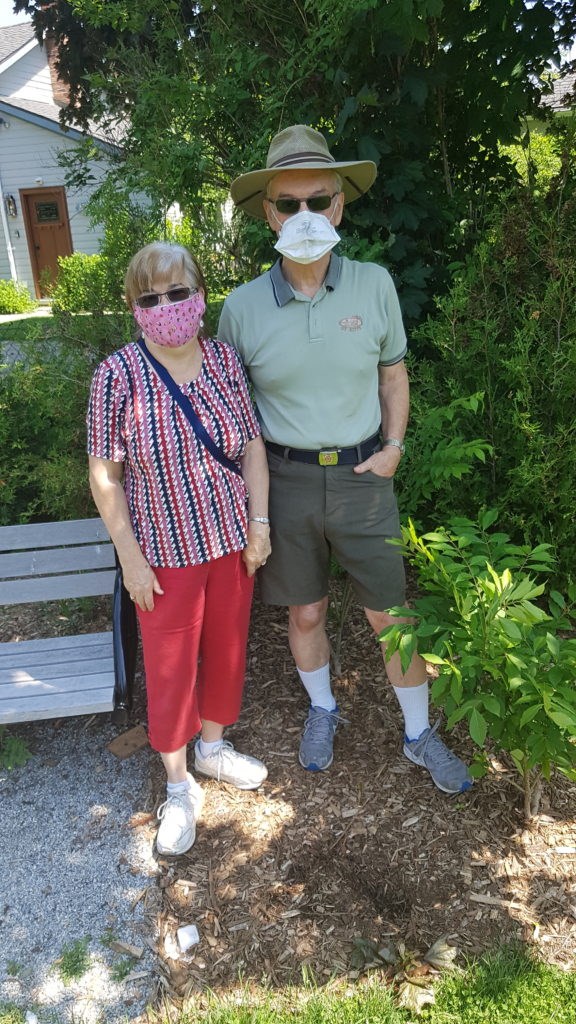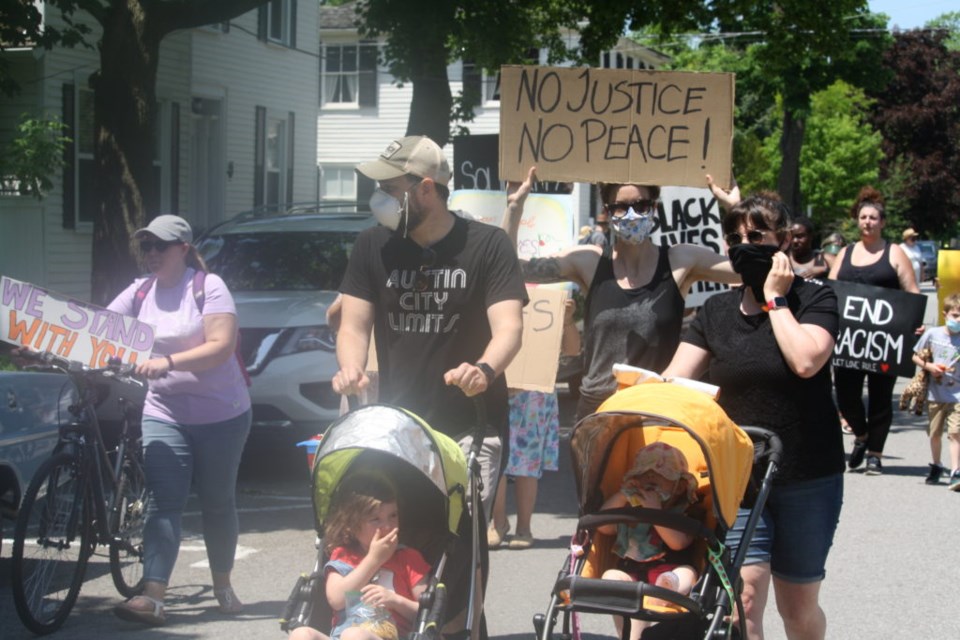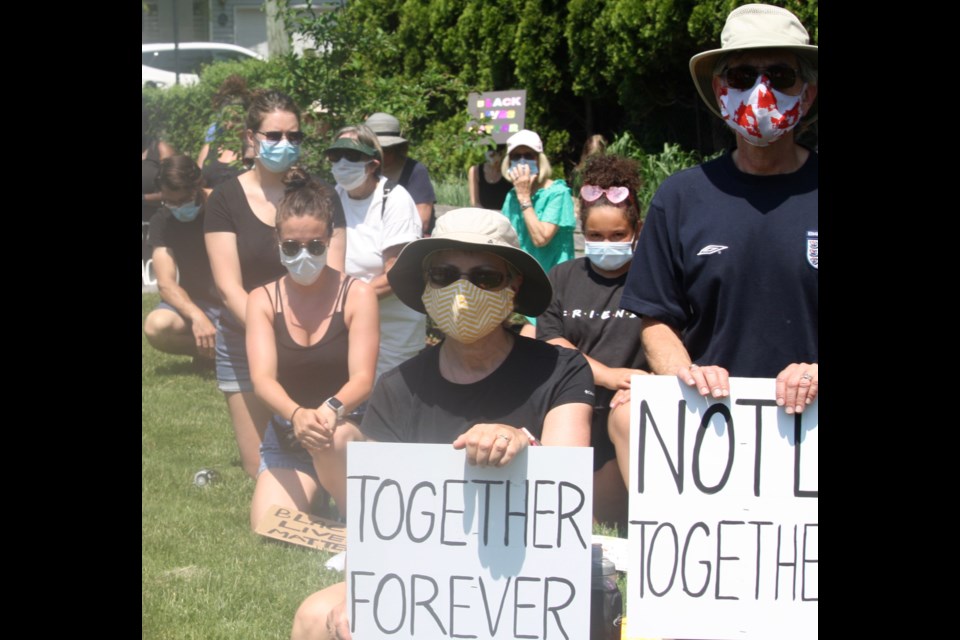With a backdrop of images that tell the story of Black history in this town, a crowd of more than 400 people attending an anti-racism rally Friday heard the message loud and clear: systemic racism exists, and ugliness lurks in this prettiest of towns.
The powerful messages from the speakers at the rally let the crowd know that if any one of them thinks, ‘not in my town, not in this town,’ they couldn’t be more mistaken.
They shared their experiences of racism in NOTL, in their working and personal lives, from employers and from friends.
To ignore that it exists is to be implicit, that the opposite of racist is anti-racist.
Yvonne Bredow spoke about years of her own silence, not speaking out when racial remarks were directed at her, because she didn’t want to hurt anyone’s feelings. “I just wanted the ground to swallow me up.” She’s not going to do that any more, she said.
She’s been told, among other things, she should grow her hair and straighten it, to pass for white. She’s been introduced by a friend as a housekeeper, and called the n-word as a joke.
She’s experienced racism in a job in NOTL, although she said her current employer has been great.
The remarks and experiences “leave scars on my heart, scars that don’t heal,” she said.
Bredow says she’s tired of hearing people say they’re shocked by her revelations about racism, that they had “no idea, this can’t be real. Our pain,” she said, “is so far off our radar that it shocks you.”
Bredow asked every white person in the crowd to raise their hand if they would be happy to be treated as Black people are treated in society. Then she asked again, and not one person raised a hand.
That says plainly they understand what is happening to Black people, she said.
“Why are you so willing and accepting for this to happen to others?” she asked.
Everyone’s talking about racism now, and some may be tired of hearing about it, she said “We have to live it, every single day.”
“When I look in the mirror, I see me. When I look at you, I see you.”
A good human being, said Bredow, “would think twice before they speak once.”
Another woman spoke at the rally, first taking time to honour Wilma Morrison, who she described as a treasure, and a tireless protector of Black history, and would have been watching over the rally, she said.
The long-time resident of NOTL was introduced by her first name at the rally, and shared her experiences with racism in town. She ended by asking those attending the event to google how to be an ally, and begin their work to affect change.
Her speech was powerful, and well-received, but days after the rally, having read hateful comments about it on social media, and fearing repercussions, she asked The Local not to quote her or use her name.
Attending the rally was Nadia McDonald, a former resident of NOTL, now living in Niagara Falls. She was there with a friend, and also her 10-year-old niece. After the rally she told The Local she was concerned about taking her young niece to the event, but the peaceful nature of the town made her trust it would be safe. It was a good, positive experience, she said, but “a first step. I’m not sure what comes next for change.”
Her father came to NOTL as a migrant worker, and he and her mother still work in town, she said.
The stories she heard from the speakers were, on one hand, shocking, that the racism they have experienced in town is so “blatant,” possibly because it’s an older community of people who grew up in a time when such comments might have seemed more acceptable. “But we can’t make excuses,” she said. They are not acceptable, “and need to be stopped.”
She said it’s important for all to hear the stories that were shared Friday. “If you don’t experience racism yourself, you can’t relate to it,” she said. “In this community, if people say ‘this is what I have experienced, this is what people have called me,’ you have to accept it.”
Her niece, Eden Noble, carrying a sign saying, “Don’t I Matter?” drew a response from one of the speakers, who said emphatically, “yes, you do matter.”
McDonald says Eden, young and shy, was uncomfortable being singled out, but it provided a good opportunity for discussion after the rally.
Eden realized the importance of the event, and after discussing it with her aunt and her mom, she had a better understanding of what it meant. Having someone so young with that message at the rally, McDonald said, seemed to have struck a nerve, with those who were faced with the fact that people can be victimized from an early age. “It created an emotional response,” she said, and once Eden talked it through with her family, she was happy to send a picture from the rally to her school.
A third speaker, Jane Andres, shared some of her experiences working with the community’s migrant workers, possibly most telling of which was that a worker planning on speaking at the rally bowed out at the last moment, for fear of losing his job.
Andres spoke of the history of NOTL, which led to the Emancipation Act passed in Niagara in 1793. She told the stories represented in the Voices of Freedom Park, of a young black woman, Chloe Cooley, who was sold, thrown in a rowboat, and taken across the Niagara River to a life of slavery. She also spoke of Solomon Moseby, imprisoned while waiting to be repatriated to his owner in Kentucky. “The local officials had arrested him, following the letter of the law. What was taking place was perfectly legal,” she reminded the crowd in the park designed to help tell his story, and others.
“Over 300 townspeople, white and black, came together and encircled the courthouse for three days,” Andres said. “Two black men, one of them a school teacher, were killed by police guards.”
They were trying to prevent Moseby from being taken away. “They were taking a stand against a system that was perfectly legal.”
While the historic events she related paved the way for change, she said, two years ago, when the park opened, “another historical marker took place when a farm worker was invited to have a seat at the celebration. He is the second generation in his family to be working at the same farm in NOTL, a total of almost 50 years invested here.”
At the opening, he read the words that explained the park: “Voices of Freedom gives expression to the silenced and forgotten stories of people of African descent, enslaved, freed, and free, whose sacrifices, labour, skills, and talents contributed to the development of Niagara-on-the-Lake. But Voices of Freedom isn’t just about looking back.
“It is a tragic injustice that, amidst the celebrated historical importance of Niagara-on-the-Lake, the Town’s significant and nation-shifting Black history has not been given a proper “hearing.” Voices of Freedom is intent on righting this wrong. Individually and collectively, all of Canada will benefit from listening to the Black voices of Canada’s past, present, and future. Such a hearing is essential for our nation to move towards a fair, just, and free society.”
The words he read at the opening, from the brochure explaining the intent of the park, “were full of promise,” said Andres, but “recent incidents that have happened in town, in the grocery store and on some of our farms are just part of an ongoing pattern that has been carefully concealed, or not spoken of for fear of retribution. This too, is a significant part of our history, a story we need to take ownership of.”
Said Andres, “it is time to pull back the veil. We can choose the hard work of building trust and respect. We can choose to create safe spaces with the intention of open, honest dialogue to build a community that is welcome to all. We can learn to listen. Or history can record that we chose to look the other way.”
Bredow spoke again to wrap up the rally, thanking people “from the bottom of my heart for coming out.”
She said we all need to do something, to speak out if someone is saying something racist.
“If you don’t say something, you are a silent racist,” she said.
Being silent is condoning it, she added. “You don’t have to be rude, just be you.”
Organizers offered an extensive list of anti-racism resources, including books to read, films to watch, and social media groups to follow: bit.ly/ANTIRACISMRESOURCES
